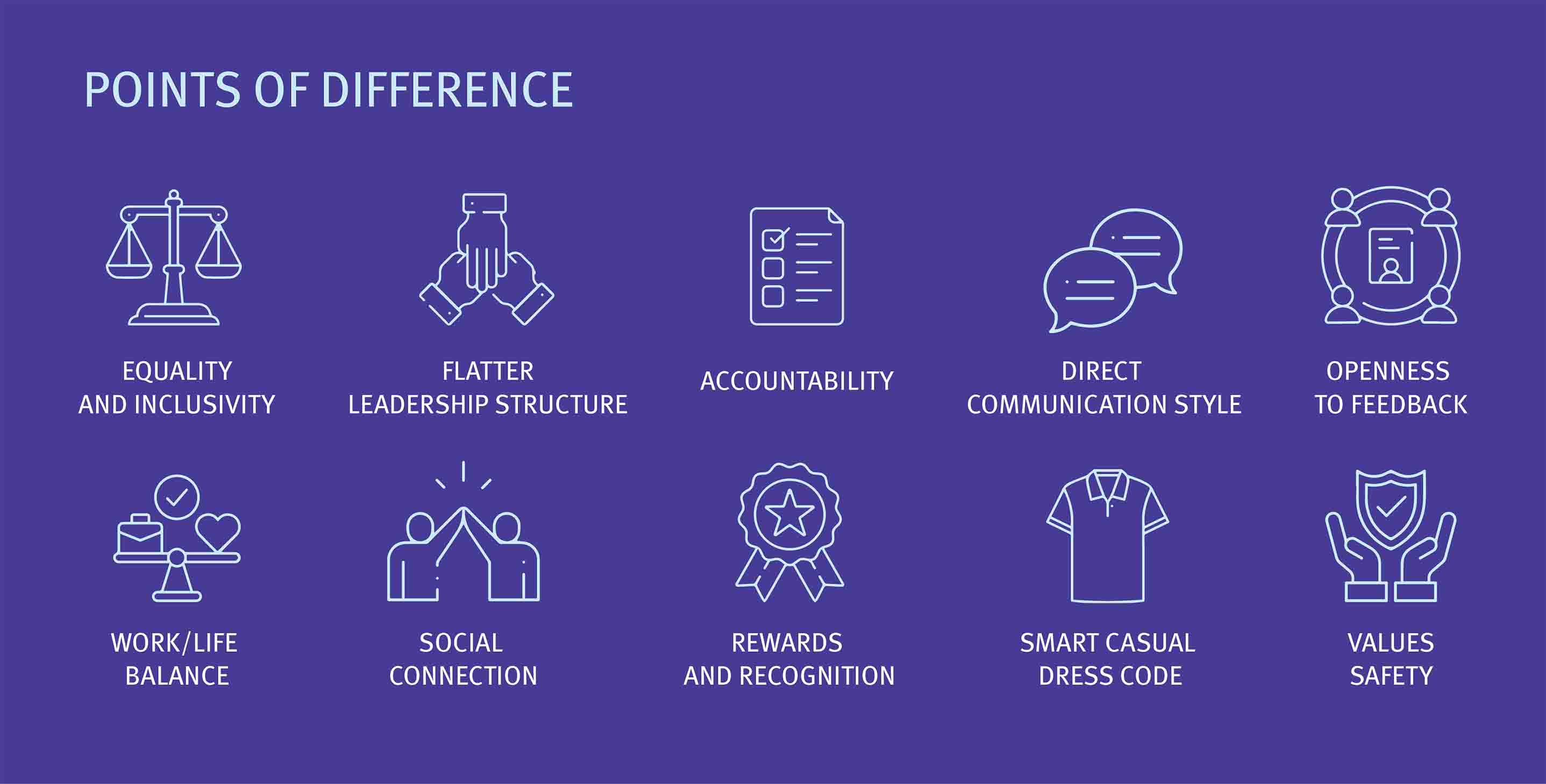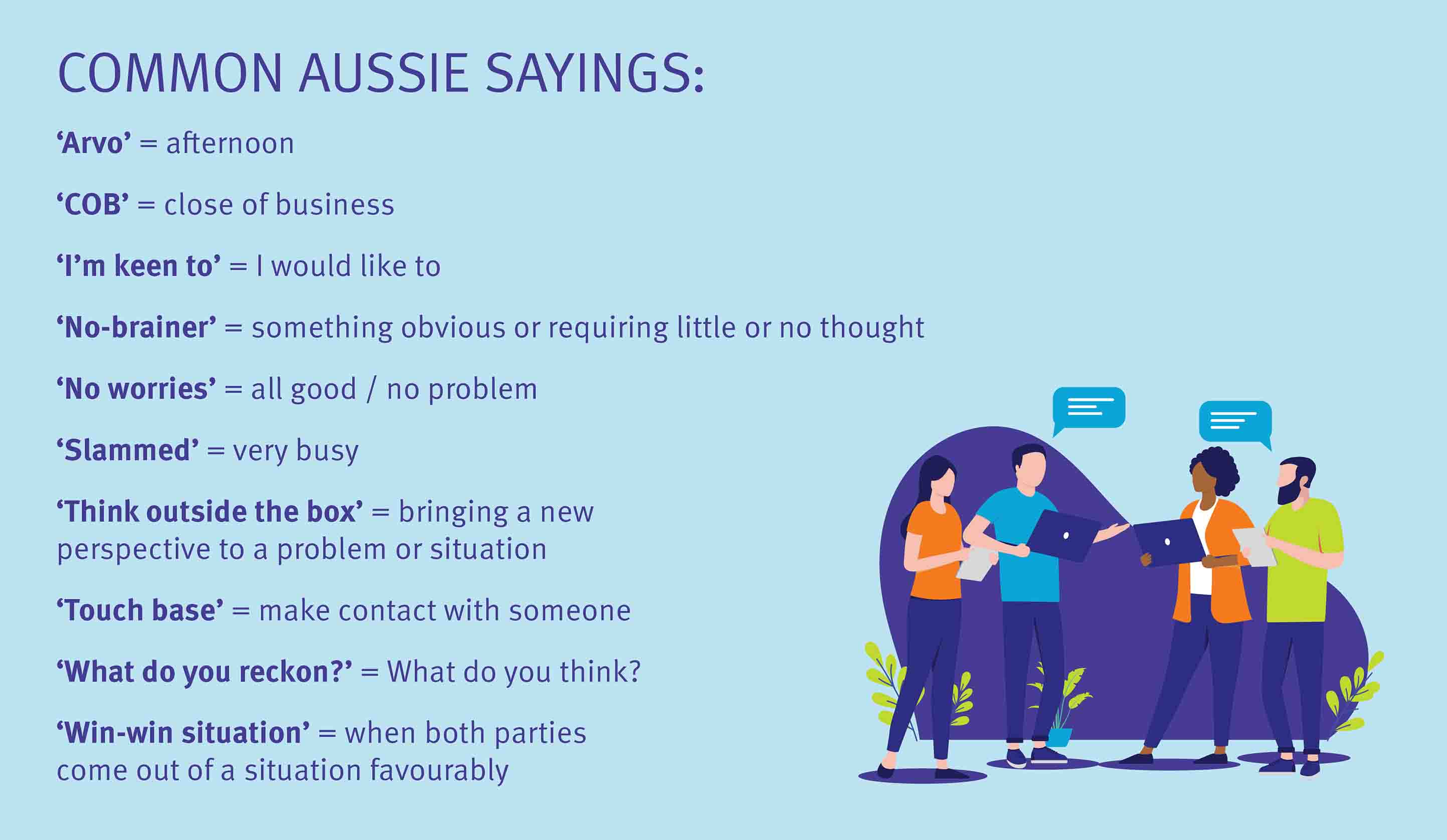Australian work culture – things you need to know
Are you a graduate starting your first office job in Australia? Or perhaps you have just moved to Australia and are looking for work?
You may be wondering what the Australian work culture will be like. Although Australians and their workplaces are known to be more relaxed and easy-going, they also have a strong work ethic.
In this blog we will:
- Define what work culture is
- Explain the things you need to know about the Australian work culture and
- Recommend the 4 things to do during your job search relating to work culture.
What is work culture?
Work culture refers to the values, beliefs and behaviours that characterise a workplace. It’s the collective attitudes and practices that influence how well a new employee can fit into their environment and how employees interact with one other.
Workplace culture is aligned with company goals while considering the well-being of individuals. It significantly impacts employee satisfaction, productivity and business performance.
What you need to know about Australian work culture

1. Equality and Inclusivity
- A ‘Fair-go’
Australian work culture strives to value and treat all employees the same. Everyone is given opportunities to grow and develop within the company regardless of gender, age, race etc. This is the concept of a ‘fair-go’.
Each employee, before they start their role, usually receives a Code of Conduct which is a set of guidelines explaining the expected behaviours and responsibilities of individuals within a company. They exist to ensure a positive and respectful work environment.
- Cultural diversity
Australian workplaces tend to be very multicultural, so you will have opportunities to meet people from all over the world and learn new perspectives and experiences.
Everyone is expected to be culturally sensitive and contribute to creating an inclusive environment. Even though culture diversity is valued, it is better to keep speaking English in an Australian workplace; speaking a language other than English with another colleague may isolate you from others as they will not be able to understand you.
2. Flatter leadership structure
- Emphasis on teams
Compared to other countries, Australians do not place much value on hierarchy. The emphasis is on teams, not the individual. Office spaces are usually open plan whereby the manager sits with their team (instead of in an office). Employees call their managers and each other by their first name and topics of conversation can be casual, not just work-related. The manager’s role is to help their team perform at their best.
- Collaboration
Unlike some cultures where leaders make the final decisions themselves, managers in Australia prefer to collaborate with their team. Each person’s opinion is considered, and decisions can be made collectively. This approach helps people feel valued and empowered to contribute to a company’s success.
There is collaboration across departments which brings together people from different areas of expertise and skill sets. Leveraging the collective knowledge of an organisation leads to more informed decisions. Some companies take knowledge-sharing further with mentoring programs or peer-to-peer learning.
3. Accountability
The Australian work culture values teamwork and everyone is expected to be accountable and perform their role to the highest standard. Australians help each other when the workloads increase so that projects can be completed on time. Open communication and building a level of trust is important. If any conflicts arise, colleagues are expected to resolve it together.
Australians try to meet challenges ‘head-on’ and respect people who tackle challenges with a positive attitude. They believe that it’s okay to make a mistake, as long as you find a solution and learn from it.
4. Direct communication style
- Direct and casual
Australians to have an open and straightforward way of communication. They are more direct (i.e. get straight to the point) than other cultures and value honesty. If you don’t understand, ask, instead of pretending to know. In the Australian workplace, language is casual but clear so that there are no misunderstandings. Although the conversations are more casual, you still need to be polite and maintain a level of etiquette.
- Australian slang
Even though the national language in Australia is English, it is different to British English. In everyday conversations there will be the use of shortened words and Australian slang. For example, “Ta” means “Thank you,” “COB” means “Close of business” and “Squiz” means “Take a look at something.”
Learn the basics of Aussie slang to become more comfortable within the culture. Don’t worry, if you do not know what a phrase means, you can always ask – Australians are happy to explain.

5. Openness to feedback
Australian workplaces view feedback as a tool for growth and improvement, instead of negative criticism. It helps individuals develop their skills and enhance their performance. Employees are encouraged to seek feedback for their work and be motivated to improve.
The leadership team often distributes surveys to gain employee feedback on how to improve business operations, processes, career pathways and the work environment.
6. Work/Life Balance
Australians value a balance between their career and personal life. They work hard during working hours but prioritise family, friends and personal well-being. Many companies offer hybrid work or remote work options to help employees achieve a better work/life balance. Other benefits provided could be extra annual leave days and wellness programs.
Helping employees manage their work in a way that suits their individual situations will lead to an increase in job satisfaction and commitment.
In Australia, office-based job hours are usually from 9am – 5pm, but you can negotiate for more flexibility. It’s important to set boundaries and minimise the amount of work you do after hours to maintain your well-being. Australians view time as limited and precious, so always be punctual for meetings; it is a sign of professionalism and respect. Consistently being late is not tolerated.
7. Social connection
Socialising in the workplace is common in Australian work culture. It helps create a more relaxed and supportive work environment. Socialising could occur any time during the day (even in meetings), helping employees connect with each other on a personal level and creating a sense of community.
A manager may have lunch with their team or go out together after work. There may be team retreats and other social events to strengthen professional relationships.
8. Rewards and recognition
Australian workplaces often celebrate an individual or a team’s milestone and recognise their contribution to company goals. Verbal praise, awards, and promotions help build a workplace of appreciation and respect. Any compliments, rewards or recognition is expected to be received in a humble manner.
9. Smart casual dress code
Workplaces in Australia adopt a more relaxed and casual dress code. Although there are roles that require more corporate attire (e.g. lawyers) or uniforms (e.g. nurses, tradespeople), employees can generally dress smart casual, but still at a professional, neat and practical level.
10. Values safety
Employee safety is very important in an Australian workplace. There are usually safety committees formed who have the responsibility to ensure the workplace conditions meet safety standards and laws and that all employees receive the relevant training to ensure their individual and each other’s safety.

The 4 things to do during your job search
Your satisfaction with a company’s work culture will directly affect your level of contentment with your job. When looking for work, find companies that instil a culture you’re comfortable with.
Here are 4 things you can do to find out more about a company’s culture:
1. Read the job description carefully
The job description will explain the company’s purpose and their brand values. Most job descriptions not only list technical requirements but also transferable skills which are skills that you can use in any role or industry (e.g. teamwork). The list of transferable skills help you get a view of the company’s culture.
2. Research the company online
A company’s website explains their values and goals. They could also have a Jobs or Careers section that list the benefits of working for them. For example, Kaplan Business School has a ‘Work with Us’ webpage that lists our brand values.
You can also have a look at a company’s social media pages which could reveal elements of their culture and interactions with their customers.
3. Look at company reviews
If you know anyone who currently works or has worked at the company, contact them and ask what it is like to work there. You can also read feedback via online review sites such as Glassdoor and SEEK.
4. Ask questions at the interview
One thing to remember at your job interview is that it goes both ways. The company isn’t just interviewing you; you’re interviewing the company too. Prepare a list of questions to ask about their work culture and environment such as:
- What initiatives do you have to promote employee well-being?
- Do you offer hybrid work?
- Do you have opportunities for career progression?
Interested in more career advice? Read our Business Career Guide and download our ‘How to Find a Job’ guide.




